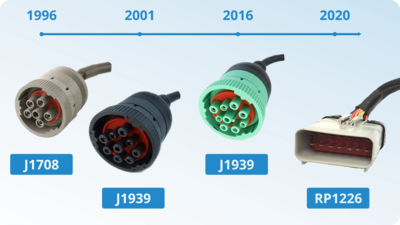The Electronic Logging Device (ELD) is here to stay. The Federal Motor Carrier Safety Administration (FMCSA) mandated the use of ELDs for all commercial trucks with GVWR over 10,000 pounds with limited exceptions. The ELD mandate when into effect in 2016, and truck drivers and fleet managers are still struggling to maintain compliance. In this blog post, we will discuss what truck drivers need to know about ELDs and how they can best adjust to the new system.
What is an ELD?
An electronic logging device (ELD) is a tool that is used to digitally record a truck driver’s hours of service (HOS) and duty status. The ELD mandate was created by the Federal Motor Carrier Safety Administration (FMCSA) as a way to improve safety for commercial drivers, reduce paperwork for drivers, and ensure compliance with the Hours of Service (HOS) regulations.
An ELD is typically installed in the cab of the truck and it connects directly to the engine control module. The device logs the truck’s mileage, speed, location, and other information to ensure that drivers remain compliant with the HOS regulations. Most ELDs can also be used to generate reports on driver performance, including fuel efficiency, idle times, and more. The data is stored in internal memory or the cloud and can be accessed by managers or regulators remotely.
Who is Required to Use an ELD?
The short answer is all commercial trucks over 10,000 pounds must use an ELD, but there are a few exceptions:
- Drivers operating under the short-haul exceptions are not required to main records of duty status
- Drivers who use paper records of duty status for not more than 8 days out of every 30 days
- Drivers who conduct drive-away-tow-away operations
- Drivers of vehicles manufactured before 2000
All truck drivers need to familiarize themselves with the requirements of the ELD mandate, so they can ensure they are compliant with the law. Failing to comply with the mandate can lead to hefty fines and other penalties, so it is important to ensure you are following all of the regulations set forth by the FMCSA.
What are the Benefits of Using an ELD?
An Electronic Logging Device (ELD) is a digital device that is used to track and record a driver’s Hours of Service (HOS). It replaces the paper logbook that drivers were previously required to maintain and keep in their vehicles at all times. By using an ELD, truck drivers can easily maintain HOS records securely and efficiently.
Using an ELD has several key benefits for truck drivers. For starters, it eliminates the need to manually calculate and record shifts, drive and cycle durations. This saves time and prevents errors. Additionally, the data collected by an ELD is much more reliable and precise than paper hours of service logs.
Another key benefit of using an ELD is that it speeds up roadside inspections since the hours of service records can be electronically transferred to the FMCSA. This helps reduce wait times and allows truckers to quickly move on with their journey.
Finally, since electronic logs are stored securely and cannot be tampered with, they provide an accurate picture of a driver’s HOS compliance and give them a legal defense should they face any charges of non-compliance.
In conclusion, ELDs offer numerous benefits for truck drivers, making them essential for maintaining HOS compliance and for streamlining the inspection process.
Why do Drivers Dislike ELDs?
ELDs are seen by many truck drivers as a means for the government or their employer to keep better tabs on their hours of service. Since ELDs can't be easily manipulated like paper logs, truckers feel like their ability to have flexible work hours has been taken away from them.
Let's face it, truck drivers love freedom, they want to be on the open road. It takes a special person to work 70 hours a week and maneuver an 80k-pound vehicle through rush hour traffic. So when the government tells a driver when they can work, how much they can work and how they can work it isn't received well.
Most truck drivers and carriers see the Hours of Service rules set by the Federal Motor Carrier Safety Administration (FMCSA) as too inflexible for drivers. For example, you may have a 14-hour window to drive 11 hours, but what if you have to sit for 5 hours waiting to pick up a load? Since most drivers are paid by the mile, they earn less money because of these rules.
Although drivers often feel like the government is forcing them to use ELDs, they may not be aware of the safety benefits. An ELD records exact times and locations which could be used in case of an accident or emergency. In addition, ELDs help ensures that drivers are taking mandated breaks and are following Hours of Service rules.
Overall, many drivers feel like their freedom has been taken away when they are required to use an ELD. While there are several benefits to using an ELD, such as improved safety and accuracy, some drivers still feel restricted by the hours of service rules and prefer to use paper logs.
The Do-It-All Fleet Management Platform.
Start Today, No Contract. No CC.
How to Choose the Right ELD
Choosing the right Electronic Logging Device (ELD) for your business is an important decision. It's important to take into consideration the needs of your business and how you will use it. Start by understanding the needs of your business. For example, do you need your ELD to support exemptions like agricultural or ready-mix? Do you need it to support intrastate HOS rules like Texas or California?
You should also analyze your management process. How will you administer the ELD? How will you ensure that your drivers are trained and compliant? It is important to have a plan in place for how you will use the ELD and make sure that your drivers are aware of the regulations. The worst thing you can do is select a vendor and just install it in your trucks without properly introducing and training drivers on the new technology.
Finally, look at the products on the market and make sure that you understand how to use and manage them. Compare different ELDs and make sure that they meet your needs.
You'll also want to make sure that your potential vendors are listed in the FMCSA listing of approved ELD providers at: https://eld.fmcsa.dot.gov/List.
Recent Blogs
by Elyse Byers
July 5, 2024




